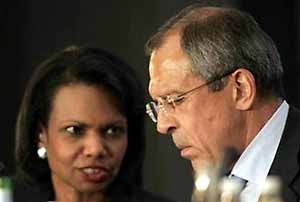July 24, 2007 (the date of publication in Russian)
Alexander Sobko, Alexander Rublev
RUSSIA PLEADS FOR SERBIA
Why this is indispensable
 EU's draft resolution on Kosovo, actually authorizing independence of Serbia's breakaway province, was excluded from UNSC'a agenda after Russia declared its commitment to veto the document. Serbia's President Vojislav Koštunica characterized this outcome as a victory of a coordinated and principle-based policy of Moscow and Belgrade.
EU's draft resolution on Kosovo, actually authorizing independence of Serbia's breakaway province, was excluded from UNSC'a agenda after Russia declared its commitment to veto the document. Serbia's President Vojislav Koštunica characterized this outcome as a victory of a coordinated and principle-based policy of Moscow and Belgrade.
Now, Washington and its allies are likely to exclude the issue from UNSC's jurisdiction, and undertake efforts to push Kosovo independence by different means – namely, through the so-called «contact group», including Germany, Great Britain, France, Italy, Russia, and the United States. Russia does not have a right for veto in this body.
In this way, Washington is going not only to fulfill its promises, granted earlier both to Kosovars and the government of Albania, but also to give effect to the threat implied in statements of Finland's ex-Premier Martti Ahtisaari. Introducing his draft, Mr. Ahtisaari had acknowledged that Kosovo independence would reflect «abridgement of Russia's foreign policy role» in Europe. It is noteworthy, however, that in case the initiative circumvents the competence of the United Nations, this would add up to abridgement of UN's authority (for which Washington has long been committed), downsizing the organization to an analogue of the pre-WWII League of Nations, reputed as an incapable and essentially decorative institution.
Meanwhile, Agim Ceku, chieftain of Kosovo separatists, has already announced the date of unilateral declaration of the region's independence. This date, November 28, remarkably coincides with Albania's Independence Day. There are few doubts that this unilateral declaration will be recognized by the United States and a number of major European nations.
We have thus found ourselves in an essentially new situation. Successively introducing Kosovo-related resolutions designedly unacceptable for Russia, Western powers have been targeting not only Serbia but the whole system of currently effectual system of international law. This was a sophisticated and multipurpose strategy. In case Moscow accepted the "Ahtisaari plan", the powers, committed for "abridgement" of Russia's influence, would achieve ultimate legitimization of Serbia's dismemberment – and that was the utmost objective. Russia has been boorishly coerced to support the plan. The coincidence of the propagandist campaign over the notorious "Litvinenko case", launched by London – not just an ally of Washington but the reputed "brain of the global West" – with the Kosovo discussion could hardly be regarded as accidental.
After Russia displayed fidelity to principle, the United States has decided to descend upon the United Nations, thus placing the whole system of international legal relations in jeopardy. How should this situation be assessed? What is Russia going to lose and to acquire?
Firstly, it is essential to realize that Russia had no other option but to deadlock the Kosovo resolution. Moscow had no other possibility to maintain its international prestige. Concession to Kosovo independence would signify a diplomatic surrender, with implications immediately echoing not only in the Balkan region – where Russia has lately elevated its influence – but also in the Caucasus, Central Asia, and the Middle East.
The failure of the scenario of "exchanging" Kosovo independence for international recognition of Abkhazia, South Ossetia and Transdniester, pushed by a number of Russian state officials and spin doctors, has opened new opportunities for Russia. Refraining from any concessions in advance, Moscow has retained a possibility for a "symmetrical" response: in case Kosovo is recognized as an independent state, Russia could unilaterally recognize the independent status of Sukhumi, Tskhinvali, and Tiraspol, following the precedent of Turkey's recognition of the Republic of Northern Cyprus.
Thus, Moscow will be able to cut the Gordian knot of the problem of post-Soviet "unrecognized states" without betraying Serbia, the closest relative of Russia among the countries of Southern Europe.
Moreover, Russia’s support of Serbian statehood may spark changes in the Belgrade leadership. The incumbent President of Serbia, Boris Tadic, is engaged in controversial political games. During the last year, Mr. Tadic, a fashion model in his past, was displaying emphatic indifference to Russia, obviously trying thus to but sympathy from the EU bureaucracy. Speaking for Serbia's unity before TV cameras, he demonstrated excessive commitment for cooperation with the Hague Tribunal, at the same time squealing on Serbian commanders who had bravely challenged Albanian gangsters, and warmly greeting Ukraine's Foreign Minister Arseniy Yatsenyuk who had openly supported US-EU initiatives of Kosovo secession. In his talk with Mr. Yatsenyuk, Serbia’s President was enough servile to promise him to open a duplicate of a Kiev memorial to the so-called "Golodomor", the famine of 1930s in the USSR which Ukraine's "orange" leaders are trying to describe as a sophisticated anti-Ukrainian scenario of Joseph Stalin.
However, Boris Tadic is supported today but not more than one fifth of Serbia’s population. He is popular mostly among the denationalized middle class of Belgrade, viewing their city as a cosmopolitan megapolis and eager for EU integration by any means, as well as among the Hungarian minority of Vojvodina and Albanians from Presevo Valley. The rest of the Serbian political class stands for developing stronger ties with Russia – including Vojislav Vojislav Kostunica's Democratic Party (DSS) which has recently established partnership with United Russia party, and certainly Vojislav Seselj's Serbian Radical Party.
Russia's commitment to deadlock the West's pro-secessionist resolution in UN Security Council will definitely emerge as a crucial landmark in the historical memory of the Serbs who regard Kosovo as a national halidom. Russia needs special relations with Serbia not only for geopolitical and economic considerations. The issue of Serbia’s integrity is the issue of identity of Orthodox Christian Europe, greatly important for Russia’s own civilizational self-identification.
Number of shows: 2569
 ENG
ENG 

 ENG
ENG 
